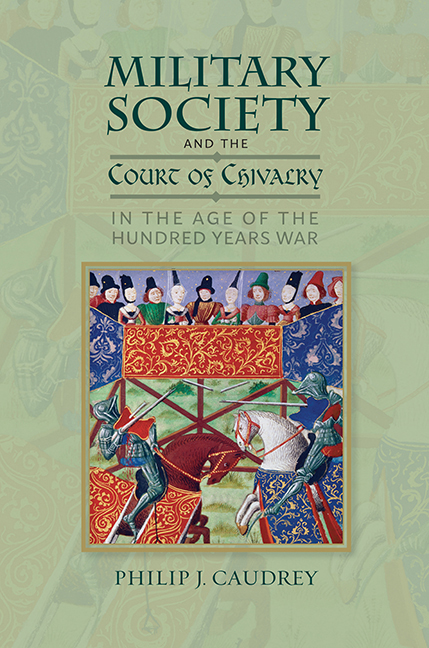Book contents
- Frontmatter
- Dedication
- Contents
- Acknowledgements
- Abbreviations
- Introduction
- 1 Military Service
- 2 Lordship
- 3 Region, Locality and Community
- 4 Soldiers, Civilians and Chivalric Memory
- Conclusion
- Appendix 1 Deponents’ Collective Military Records According to their Own Testimony
- Appendix 2 Lancastrian Retainers: Scrope & Hastings Defendants
- Appendix 3 Plaintiffs’ and Defendants’ Biographies
- Bibliography
- Index
- Warfare in History
4 - Soldiers, Civilians and Chivalric Memory
Published online by Cambridge University Press: 21 June 2019
- Frontmatter
- Dedication
- Contents
- Acknowledgements
- Abbreviations
- Introduction
- 1 Military Service
- 2 Lordship
- 3 Region, Locality and Community
- 4 Soldiers, Civilians and Chivalric Memory
- Conclusion
- Appendix 1 Deponents’ Collective Military Records According to their Own Testimony
- Appendix 2 Lancastrian Retainers: Scrope & Hastings Defendants
- Appendix 3 Plaintiffs’ and Defendants’ Biographies
- Bibliography
- Index
- Warfare in History
Summary
Long before historians began appraising the Court of Chivalry's testimony for insights into patterns of military service and retinue formation, or evidence of inter-gentry solidarities, it was above all the impressive chivalric flavour of the depositions that caught the eye of early scholars. From Sir Harris Nicolas’ effusive claims about the reign of Edward III representing ‘the brightest page in the annals of British chivalry’, to Maurice Keen's suggestion that members of the Scrope family would have provided fine models for Chaucer's Knight, to Keen's later assertion that the Hastings testimony lacked the chivalrous gloss found in the depositions of the 1380s, there has been widespread acknowledgement amongst historians that the Scrope and Morley testimony in particular provided vivid insights into the world of English chivalric culture in the fourteenth century. In essence, what we possess in the surviving Scrope, Morley (and, indeed, Hastings) depositions is an eclectic body of chivalric memories, expressed through an intricate and interlocking combination of war recollections, family and regional history, and popular hearsay, augmented by a combination of written and iconographic material. The concept of ‘chivalric memory’ has been aptly defined as ‘a form of family memory, part of the stock of myths and narratives passed down over the generations, which brought lustre to a family's name’, but which ‘also belonged to the chivalric class as a whole’. As we shall see, when that chivalric class came before the Court of Chivalry, their testimony revealed not merely partisan support for their protagonist, but more broadly laid bare the extent to which chivalric memory, beneath its national façade, had taken deep root within the localities, acting as a source of cultural cohesion for the realm's regional military communities.
This chapter explores the character of English chivalry between the reigns of Edward III and Henry IV by engaging with the testimony provided in all three armorial cases and relating the deponents’ various strands of tale-telling, hearsay, war memories and iconographic evidence to the wider chivalric culture of the age. Its purpose is to tease out – through the words of those who deposed before the Court – the everyday impact of the Hundred Years War, and the chivalric ethos it spawned, upon genteel society at a national, regional, and intensely local, level.
- Type
- Chapter
- Information
- Publisher: Boydell & BrewerPrint publication year: 2019



